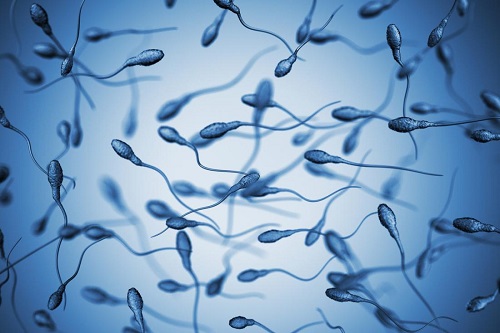The Lifespan of Sperm
Sperm, the microscopic cells responsible for fertilization, have the potential to survive for varying lengths of time depending on the conditions they encounter inside a woman's body.

While the general consensus suggests that sperm can live up to 5 days in optimal conditions, it is important to note that this is not always the case. The truth is that the survival of sperm varies widely and is influenced by various factors.
Factors Affecting Sperm Longevity:
1. Quality of Cervical Mucus: The cervical mucus plays a vital role in the survival and transportation of sperm. This mucus provides a conducive environment, protecting the sperm and helping in their journey towards the egg. The thickness and texture of the mucus change during the menstrual cycle, with the most fertile mucus being present around ovulation. On average, sperm can live for 2-3 days in cervical mucus.
2. Timing of Intercourse: Understanding the timing of ovulation is crucial in determining the viability of sperm. The fertile window typically spans a few days, centered around the day of ovulation. By having intercourse prior to ovulation, sperm can wait in the fallopian tubes for the release of the egg. While sperm can survive in the fallopian tubes for about 48-72 hours, an egg released closer to ovulation provides the best chance of fertilization.
3. Vaginal Conditions: The acidic environment of the vagina can pose challenges for sperm survival. However, the vagina becomes less acidic during ovulation, which allows for a more favorable environment and increases the lifespan of sperm.
4. Individual Fertility: It's important to remember that fertility varies among individuals. Some may have longer or shorter sperm survival times depending on factors such as sperm health, age, and medical conditions.
Conclusion:
While it is commonly believed that sperm can live for up to 5 days, the actual lifespan can vary greatly depending on several factors. Understanding the timing of ovulation and the influence of cervical mucus can increase the chances of successful fertilization. Ultimately, conception is a complex process that relies on numerous factors aligning perfectly.
By debunking common myths and shedding light on the science behind sperm survival, this blog post aims to provide a clearer understanding of how sperm behave within the female reproductive system.
Related FAQs about how long does sperm live
How long can sperm live outside the body?
Sperm cannot survive for long outside the body. Once exposed to air, sperm quickly loses its ability to fertilize an egg. It is best to ensure that sperm remains inside the female reproductive system for the highest chance of successful fertilization.
Can sperm survive in water?
No, water is not a suitable environment for sperm survival. The lack of necessary nutrients, temperature control, and the presence of chemicals in water make it highly unlikely for sperm to survive or maintain their fertilization capability.
Can sperm live for a week inside the female reproductive system?
While it is possible for sperm to live up to 5 days inside a woman's reproductive system, the average lifespan is closer to 2-3 days. Factors such as cervical mucus quality, timing of intercourse, and vaginal conditions can affect the longevity of sperm.
Do all sperm die after intercourse?
No, not all sperm die after intercourse. The survival of sperm depends on various factors such as the quality of cervical mucus, timing of intercourse, and the individual's fertility. While some sperm may die shortly after ejaculation, others can survive for a few days within the female reproductive system.
Can sperm survive during menstruation?
In general, the chances of sperm surviving during menstruation are very low. The shedding of the uterine lining and the changes in the vaginal environment make it extremely challenging for sperm to survive and fertilize an egg during this time. Therefore, the likelihood of conception during menstruation is minimal.
Glossary about how long does sperm live
1. Sperm: Sperm are the male reproductive cells or gametes that are essential for fertilization to occur. They are microscopic in size and produced in the testicles of males.
2. Fertilization: Fertilization is the process where a sperm cell fuses with an egg cell, resulting in the formation of a zygote. This marks the beginning of pregnancy.
3. Cervical Mucus: Cervical mucus is a fluid produced by the cervix, the narrow passage connecting the uterus to the vagina. It plays a crucial role in fertility by assisting the movement and nourishment of sperm.
4. Fallopian Tubes: The fallopian tubes, also known as uterine tubes, are a pair of narrow tubes connecting the ovaries and the uterus in females. These tubes serve as a pathway for the egg and sperm to meet for fertilization.
5. Ovulation: Ovulation is the release of a mature egg from one of the ovaries. It typically occurs once during each menstrual cycle and is a key event in fertility.
6. Vagina: The vagina is a muscular canal located inside a woman's body, leading from the cervix to the external opening. It plays a crucial role in sexual intercourse and childbirth.
7. Acidic Environment: The acidic environment refers to the pH level of the vagina, which is naturally acidic to prevent the growth of harmful bacteria. The acidity can affect sperm survival.
8. Fertility: Fertility refers to a person's ability to conceive and successfully carry a pregnancy to term. Factors such as sperm health, egg quality, and overall reproductive health influence fertility.
9. Testicles: The testicles, also known as testes, are male reproductive organs responsible for the production of sperm and the hormone testosterone.
10. Zygote: A zygote is the initial cell formed after the fusion of a sperm and an egg during fertilization. It is the earliest stage of embryonic development.
